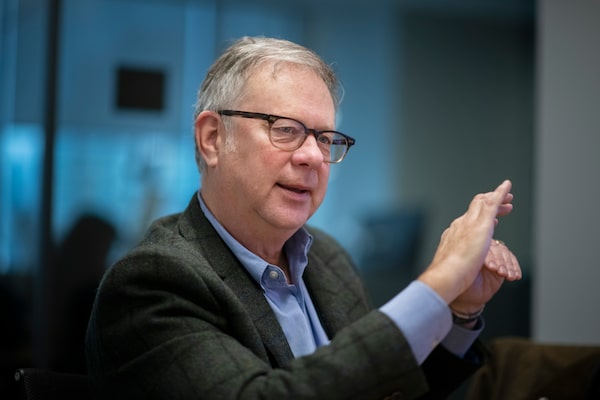
Dr. Bruce Lourie, president of the Ivey Foundation, says the foundation has determined that the need to transform industrial policies to meet climate goals is too acute to keep funding projects at its current rate.Fred Lum/The Globe and Mail
One of Canada’s largest and oldest philanthropic organizations has decided to wind down and distribute its entire endowment – $100-million – to expedite efforts to align the economy with net-zero emission targets.
The Ivey Foundation has determined that the need to transform industrial policies to meet climate goals is too acute to keep funding projects at its current rate, said Bruce Lourie, the foundation’s chief executive officer. The money will be dispersed to its slate of economic and environmental partner organizations over the next five years.
Dr. Lourie said slashing carbon emissions by 40 per cent to 45 per cent below 2005 levels by 2030 and getting to net zero by 2050, as per Ottawa’s international commitments, are only getting tougher to achieve.
“We think if ever there was a time for us to double down, if ever there was a time for the country to double down, on dealing with these complex issues, it’s now,” he said in an interview. “We saw mixed reviews of what came out of COP27 in Egypt, and as a country, as a world, we’ve got less than eight years to meet our 2030 targets, and our emissions are still going up.”
The sum to be distributed is equal to the amount the foundation has bestowed since Richard G. Ivey and his son Richard M. Ivey established it in 1947. It began focusing on programs marrying economic and environmental goals in 2014.
From the foundation’s perspective, the two biggest risks facing the country are failing to adequately deal with climate change and missing related economic opportunities, such as electric vehicle and battery manufacturing and transforming the power grid, as other countries establish dominance in those areas. “So, in our philanthropic work, we’re really trying to integrate those two things – Canada’s competitiveness and prosperousness, together with the need to address our emissions,” Dr. Lourie said.
The foundation has funded a number of bodies focused on mass electrification, decarbonizing the power supply, boosting energy efficiency, planning for energy transition in specific sectors, and building up carbon capture and removal technology. Among them: the Transition Accelerator, the Canadian Climate Institute, the Institute for Sustainable Finance, the Canadian Centre for Energy Information and the Canadian Climate Law Initiative.
Such organizations are focused on transforming industries to thrive in a low-carbon economy. That involves attracting investment money from the private sector and directing it to priority areas. A new risk is U.S. President Joe Biden’s Inflation Reduction Act, which includes US$369-billion for green energy and clean tech; with its investment incentives, the legislation threatens to direct capital away from opportunities in Canada, Dr. Lourie said.
“As a country, we need to ramp up our investments in this new economy, in new energy systems,” he said. “I think a lot of people in business in Canada are worried that the Americans are going to eat our lunch. It’s a much bigger market. They’ve got a very sophisticated and generous tax incentive program. They’ve got a very sophisticated group at the Department of Energy.”
Canadians, meanwhile, are looking for leadership at the provincial level, and so far that’s lacking in many cases, he said.
The Ivey Foundation is one of several philanthropic endeavours of the Ivey family, whose patriarchs were prominent corporate lawyers and business executives. Richard M. Ivey also established the Ivey Business School at Western University in London, Ont., and the family has made grants in that city to support health care research and hospital facilities as well as the arts. Richard M. Ivey died in 2019, but the family has continued its philanthropy, focusing largely on environmental issues.
Foundation chair Rosamond Ivey (Richard M. Ivey’s daughter) and Dr. Lourie wrote in an open letter that “$100-million is a drop in the bucket of what is required to mitigate climate change and build a sustainable economy.” However, they said, the foundation is collaborating with other philanthropic organizations, as well as experts in academia, government, industry and non-governmental organizations devising plans to get to net zero, she said. “This collaborative approach helps ensure that funding and actions are multiplied well beyond what Ivey Foundation can achieve alone.”
The foundation hopes its move may inspire other private funders to do the same, they said.
James Meadowcroft, the research director for the Transition Accelerator and a professor in the School of Public Policy and Administration at Carleton University, said the initiative should kick-start the development of a green industrial policy, supporting such efforts as building a supply chain encompassing raw materials and parts for electric vehicles.
“Canada is really well positioned, but we need to act now, because our competitors from the U.S. and Europe and so on are bailing into these supply chains now. We have such a comfortable standard of living and so many natural resources that Canada can tend to be a bit slow. We’ve done well in the oil era. Oil and gas remain our principal export earners, but it’s not going to be that indefinitely,” he said.
Dr. Lourie said foundations benefit from tax advantages when they are created, and endowments are typically distributed over many decades. “Our thinking is that this is really an opportunity to take the resources we have and make sure that the generations that are feeling the effects of climate change today, and might miss the opportunities in the economy, are getting the full advantage of our ability to spend the endowment over the next five years,” he said.
 Jeffrey Jones
Jeffrey Jones